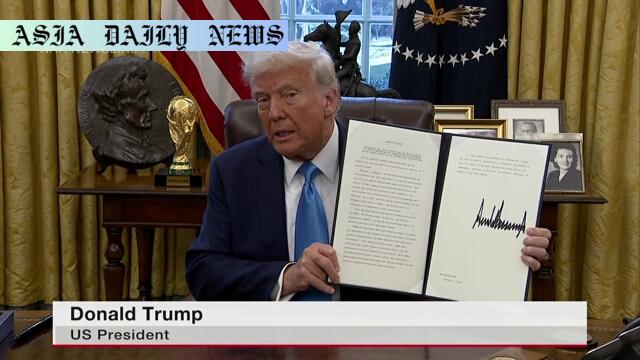UN Withdrawal: Trump signs an executive order for the US to leave the UN Human Rights Council, impacting international cooperation.
- Key Point 1: US President Donald Trump signed an executive order withdrawing the US from the UN Human Rights Council.
- Key Point 2: Trump also ordered a review of US involvement in UNESCO and UNRWA, criticizing these bodies for inefficiency and bias.
- Key Point 3: The US previously left these UN agencies under Trump but rejoined them under Biden’s administration to promote cooperation.

Introduction: The Implications of the US Withdrawal from UN Bodies
The recent decision by former US President Donald Trump to sign an executive order withdrawing from the UN Human Rights Council (UNHRC) and cutting ties with other major UN agencies has sparked global debate. The move reflects Trump’s ongoing skepticism towards international organizations, a sentiment he voiced during his presidency. By questioning the efficacy and bias of these institutions, Trump emphasized a shift towards unilateral action and reduced international financial commitments.
Criticism of the UN and Its Institutions
In his remarks from the Oval Office, Trump criticized the United Nations as failing to fulfill its intended purpose. He referred to the organization as poorly managed and argued that US financial contributions to these agencies were disproportionate. This criticism is not new, as Trump had aired similar grievances during his first presidency, citing bias against Israel and inefficiency in addressing global human rights issues as core concerns.
Targeting the UN Human Rights Council
The UNHRC has often been a subject of political contention, with member states accusing it of partiality and ineffectiveness. Trump’s order to withdraw from the council aligns with his administration’s critical stance on organizations perceived as favoring Palestinian interests over Israel’s security and sovereignty. This decision further reinforces Trump’s alignment with domestic conservative bases, who share these concerns.
Review of US Involvement in UNESCO and UNRWA
Another significant aspect of Trump’s order is the directive to reconsider US involvement in UNESCO and the UN Relief and Works Agency for Palestine Refugees in the Near East (UNRWA). Both organizations have faced scrutiny under Trump’s administration, which claimed they propagate inefficiency and financial misuse. By re-evaluating these relationships, Trump has signaled an intent to recalibrate the US stance on global partnerships.
Historical Context of US-UN Relations
This is not the first time the US has distanced itself from the UN under Trump’s leadership. During his first presidency, the US had similarly withdrawn from UNESCO, accusing it of anti-Israel bias, and from the UNHRC, citing a lack of neutrality. These moves were reversed under President Joe Biden, who prioritized multilateralism and international cooperation. The cyclical nature of the US-UN relationship underscores how domestic politics shape America’s engagement with global institutions.
The Financial Argument: Reducing US Contributions
Trump’s claim regarding the disproportionate financial contributions by the US to the UN highlights another recurring theme in his administration’s approach to international bodies. The United States is one of the largest contributors to the UN, often shouldering a significant percentage of the funding required for its operations. Trump argued that this financial arrangement is unfair and places undue burden on American taxpayers, further justifying the withdrawal.
Impact on International Cooperation and Human Rights
The decision to disengage from the UNHRC and potentially other UN agencies raises questions about the impact on international human rights advocacy and global cooperation. Supporters of Trump’s approach argue that the UNHRC has failed to adequately address human rights violations in authoritarian regimes, rendering it ineffective. Critics, however, warn that the US withdrawal undermines the credibility and leadership of the council, potentially emboldening violators.
Future of US-UN Relations
Looking ahead, the trajectory of US-UN relations will largely depend on the administration in power and its foreign policy goals. While Trump’s actions demonstrate a preference for unilateral decision-making and less financial reliance on international organizations, future administrations may seek to rebuild and strengthen these partnerships, as was witnessed during Biden’s presidency.
Conclusion: The Debate over Global Engagement
Trump’s bold move to withdraw the US from prominent UN organizations has reignited discussions about the value and efficacy of multilateralism versus unilateralism. This decision reflects broader ideological divides within the US regarding its role on the global stage. As the world navigates complex challenges, including human rights violations and refugee crises, the absence of the US in key global discussions may have profound ramifications for both domestic and international stakeholders.



Commentary
Reflecting on the US and the UN: A New Chapter
Trump’s decision to withdraw the US from the UN Human Rights Council and other agencies marks yet another defining moment in the country’s complex relationship with international organizations. It is a move that undoubtedly reflects his administration’s ideological stance – one grounded in skepticism towards multilateralism and a focus on perceived fairness in contributions and operations.
Evaluating the Risks and Benefits
This step, while catering to Trump’s domestic allies, has far-reaching global implications. Critics are right to question the potential vacuum left in US leadership on the international stage. Without American participation, these organizations may struggle to maintain credibility and financial sustainability. On the other hand, proponents argue that this could catalyze reform in UN bodies, pushing them to address inefficiencies and organizational biases.
A Turning Point for Global Governance
The future of global governance depends on strong, collaborative partnerships. Trump’s withdrawal signals a rethinking of traditional alliances and engagement strategies. While it may spur short-term recalibration within international bodies, the long-term outcome hinges on how the US redefines its position in a world that increasingly demands unity to tackle shared challenges.